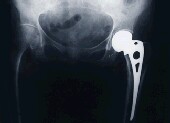
MONDAY, Feb. 18 (HealthDay News) — Overall, the vast majority of total hip replacement surgeries are successful, but according to the results of a new study, women are at greater risk than men for implant failure after this procedure.
Researchers noted this was true even after taking other individual risk factors into account. They said their findings could help doctors better manage the anatomical differences between men and women.
“The role of sex in relationship to implant failure after total hip [replacement] is important for patient management and device innovation,” the study authors wrote in the report published online Feb. 18 in JAMA Internal Medicine.
The researchers, led by Maria Inacio, of the Southern California Permanente Medical Group in San Diego, tracked more than 35,000 hip replacements that were performed at 46 different hospitals over an average follow-up period of three years. Of the patients followed, 57 percent were women who were an average age of about 66 years old.
Women more often received 28-millimeter (mm) femoral heads, while men had a higher proportion of 36-mm or larger heads. The “femoral head” is the ball-shaped top of the thigh bone that fits into the hip socket, creating the hip’s “ball-and-socket” joint.
Today’s artificial hips are made of a variety of materials, including metal and newer types of plastics or “polyethylene.” The investigators noted that nearly 61 percent of women had metal on highly cross-linked polyethylene-bearing surfaces, compared with just under 54 percent of men. Meanwhile, 19 percent of men had metal-on-metal-bearing surfaces, compared with just under 10 percent of women.
After five years, the study showed that 97 percent of the implants survived. The researchers pointed out, however, device survival for men (97.7 percent) was deemed significantly higher than that of women (97.1 percent).
In response to the study’s findings, Diana Zuckerman, from the National Research Center for Women & Families in Washington, D.C., commented in a journal news release: “Sex-specific analyses are especially important in orthopedics because of substantial anatomical sex differences.”
Zuckerman added the study provides an “important first step” in understanding higher risk of hip implant failure in women, but longer follow-up is necessary to help reduce the likelihood of revision surgery.
“What is urgently needed is long-term comparative effectiveness research based on larger sample sizes, indicating which [total hip replacement] devices are less likely to fail in women and in men, with subgroup analyses based on age and other key patient traits, as well as key surgeon and hospital factors,” concluded Zuckerman. “Such data would enable patients and their physicians to choose the hip devices and surgical techniques that are most likely to be successful for a longer period.”
More information
The American Academy of Orthopaedic Surgeons has more information on hip implants.

